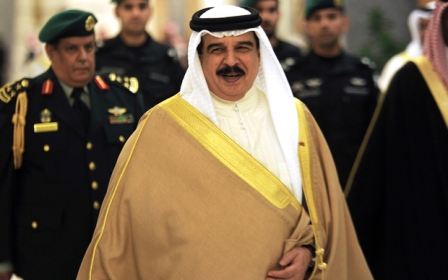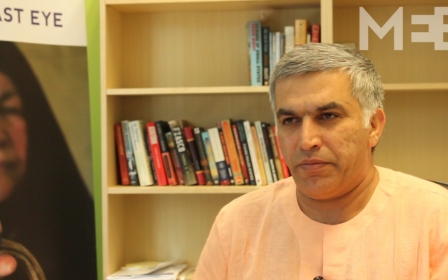UN experts call for immediate release of Bahraini campaigner Rajab

Bahrain's detention of activist Nabeel Rajab is unlawful and violates his right to freedom of expression, UN human rights experts have found, calling on the kingdom to release him immediately with compensation.
There was no immediate reaction from Bahraini authorities to the appeal by the UN Working Group on Arbitrary Detention, which said the government had not responded to its requests for information on the high-profile case.
Bahrain has cracked down on perceived threats since Arab Spring protests in 2011 were quashed with the help of Gulf Arab neighbours.
Rajab was sentenced to five years in prison in February for criticising Saudi Arabia's air strikes in Yemen and writing tweets accusing Bahrain's prison authorities of torture.
A leading figure in the pro-democracy protests, he was already serving a two-year term over a news interview in which he said Bahrain tortured political prisoners.
In a formal opinion posted overnight, the UN panel of five independent experts said that provisions of Bahrain's penal code were "so vague and overly broad" that people were punished for merely exercising their rights under international law.
"The Working Group therefore considers that Mr Rajab’s deprivation of liberty is arbitrary," it said, adding that "no such trial" should have taken place.
It considered that Rajab's political views were "clearly at the centre of the present case and that the authorities have displayed an attitude towards him that can only be characterized as discriminatory; indeed, he has been the target of persecution, including deprivation of liberty, for many years and there is no other explanation for this except that he is exercising his right to express such views and convictions".
Rajab, held since June 2016, should be released immediately and compensated, it said.
The opinions of the panel are based on national obligations under international human rights law that they have ratified and are thus legally-binding in nature, says the UN panel.
Separately, the UN Human Rights Committee called last month for Bahrain to release activists including Rajab.
The United States, which has a major naval base in the country, has expressed concern about his case.
Sayed Ahmed Alwadaei of the London-based Bahrain Institute for Rights and Democracy, said in a statement: "The UN has now unequivocally found that Bahrain is arbitrarily detaining Nabeel Rajab in violation of numerous international legal standards – these vital findings cannot be ignored".
He called for Bahrain's allies, including the United Kingdom, to back the call for Rajab's release, adding: "Anything short of that is a tacit endorsement of Bahrain’s patently criminal behavior."
During an interview with Middle East Eye that Rajab gave in August 2014, he said that since the 2011 uprisings, Bahraini activists had been successful in raising awareness among Western countries, international organisations and journalists of the kingdom's human rights violations.
Despite this, he said Bahrain had been "going backwards".
"We have more political prisoners, more repression, more laws being created that violate human rights," he said. "You have a majority of politicians either in jail or in exile or hidden in Bahrain so that is something [that is] not good... We have been going backward the past month and years."
New MEE newsletter: Jerusalem Dispatch
Sign up to get the latest insights and analysis on Israel-Palestine, alongside Turkey Unpacked and other MEE newsletters
Middle East Eye delivers independent and unrivalled coverage and analysis of the Middle East, North Africa and beyond. To learn more about republishing this content and the associated fees, please fill out this form. More about MEE can be found here.




